Ordering food online is once again in the spotlight for its rising costs. A social media post on Sunday went viral after a customer alleged that food ordered through Swiggy was 81% more expensive than buying directly from the same restaurant located just two kilometres away.
In his post on X (formerly Twitter), the customer compared prices of four items: For 10 pieces of porotta, the restaurant charged Rs 180, while Swiggy billed Rs 350. Chicken 65 was priced at Rs 150 at the outlet, against Rs 240 on the app. A plate of chicken lollipop cost Rs 200 at the restaurant but Rs 320 on Swiggy, while chicken thokku biriyani was billed at Rs 280 in person and Rs 460 online. The final restaurant bill came to Rs 810 (inclusive of GST), compared to Rs 1,473 on Swiggy, a difference of over Rs 660. The wide gap has sparked debate over the economics of food delivery, even as platforms continue to hike their fees.
User reactions highlight a divide
The post drew a range of reactions. Many users said such discrepancies were common. “Every time it happened, but people don’t care, that’s why they are charging too much,” one user wrote. Another noted, “Swiggy and Zomato both do this. Their prices are different compared to the shop. Still, they are in loss… with so much higher rate and still not reflecting in the bottom line, it’s assumed they have a higher cost of burning/operation.”
Some argued that while a 20–30% premium was typical on aggregator platforms, an 80% hike was excessive. However, others defended the practice as the cost of convenience. “You want the safety of the app, the delivery on time, the customer service, the variety on your fingertips… either pay the premium or go and get it yourself,” one user wrote.
Another section of users pointed to restaurants themselves. “I may be wrong but I think it is the restaurant that set up prices online? Swiggy may add fees on top but menu item prices are likely manipulated by the owner,” a user commented.
Rising costs in food delivery
The debate comes at a time when food delivery platforms have increased their platform fees in the run-up to the festive season. Swiggy has raised its fee to Rs 15 (inclusive of GST) in select markets, while Zomato has increased it to Rs 12.50 per order (excluding GST). Magicpin, the third-largest player, has positioned itself as the cheapest, keeping fees at Rs 10 per order.
From September 22, an 18% Goods and Services Tax (GST) will also be levied on delivery charges, further raising consumer bills. Industry estimates suggest the new tax will add about Rs 2 per order for Zomato users and Rs 2.6 for Swiggy customers.
Platform fees and mark-ups have become an important revenue stream for delivery companies. Analysts note that the strategy of hiking fees around festive seasons and retaining them later has already been tested by Zomato since last year. Yet, with consumers increasingly vocal about the widening gap between restaurant and app prices, industry pricing practices are set to face closer scrutiny.

